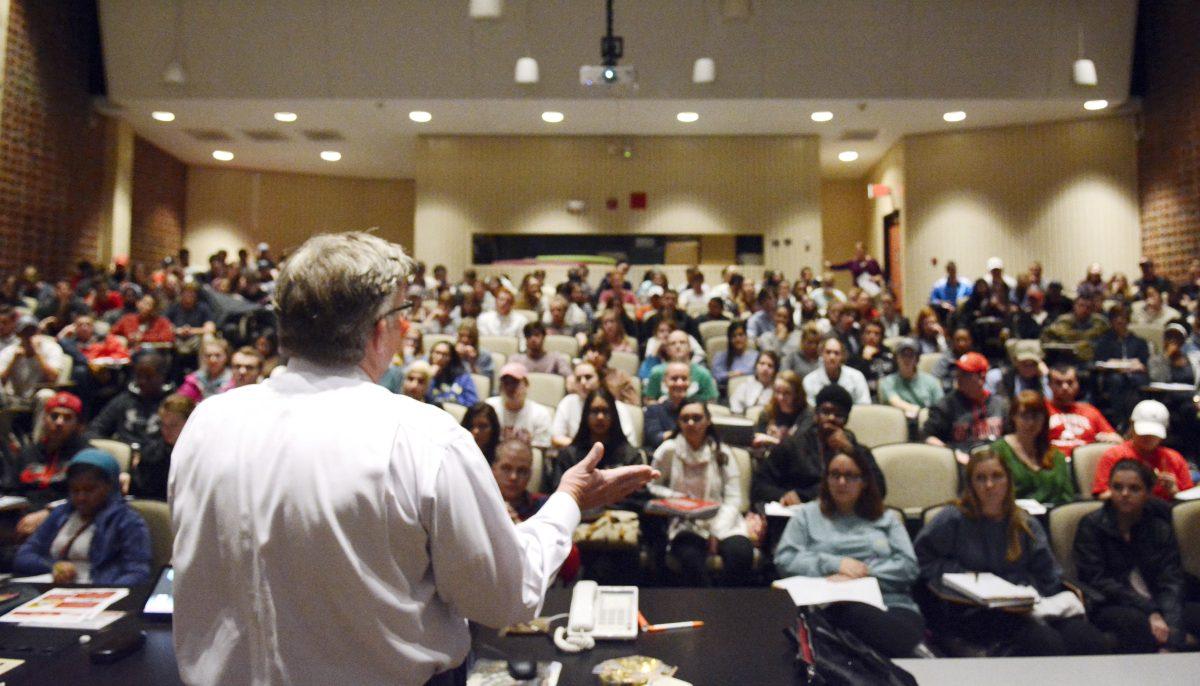Greg Fishel, chief meteorologist at WRAL, woke up one morning five years ago with a nagging question on his mind: “Greg, are you doing the same thing that the people you’re criticizing are doing, in that you’re just looking for information to support what you already think?”
He was searching for information to support his beliefs that climate change was not real. Educated at Pennsylvania State University and certified by the C, it took Fishel a while to shake off those false pretenses. Fishel drove a Prius before he accepted the reality of climate change.
Fishel admitted to being a climate change skeptic Monday afternoon to, biological sciences teaching assistant professor, Jennifer Landin’s BIO 105 class and how he realized the core of the issue.
He said we can be stuck in dangerous “ideological trenches,” where we only seek information that feeds into our belief system and proves that what we believe is right.
Fishel asked, “How many people do you know, myself included, go about life every day to try and find people or information that tells us we’re wrong?”
If we did this, Fishel said, we would have to admit we “goofed up” or “didn’t know enough.”
“We have developed this tribal loyalty, where you have to walk in one step with your tribe with everything,” Fishel said.
Fishel explained that we listen to podcasts, read blogs, follow social media and watch news that fit into what we want to hear and see, including what science we choose to fit into our molded beliefs.
Fishel started reading peer-reviewed articles, talking to other scientists and finding information that went against his doubts of climate change. Fishel said he found it difficult to make an argument that humans weren’t making some effect on climate change.
When Fishel accepted that climate change was a legitimate occurrence, he said his friends and family criticized him for caving because he changed his mind on the issue.
“I didn’t change my mind, I just opened it,” he explained.
But that’s when he realized that the issue was deeply politically and religiously rooted.
“Politics and religion are right at the core. And neither one of them has to be,” Fishel said.
Fishel considers himself to be an avid Christian, but he does not believe there is exclusivity between faith and science.
“I’ve always looked at science as being the discovery of God’s creation,” Fishel said.
Fishel said some Christians argue that we can be arrogant thinking that humans could alter earth’s atmosphere — a part of God’s creation.
“We dropped two bombs on Japan in 1945, didn’t we prove that if we wanted to destroy the planet we can?” Fishel exclaimed. “He gave us that ability, I don’t think He wanted us to use that ability, but we can.”
Fishel also used the example that the Bible references the Earth being the center of the universe, but Galileo disproved that notion.
“Is it possible that God was using Galileo to teach us something about His creation?” Fishel asked.
Fishel is now a registered Independent so he doesn’t play into the “liberal” or “conservative” narrative, but instead, takes a scientific stance.
“Our default is we want to try and fight,” Fishel said. “We want to try and fight and argue about stuff, instead of coming up with some sort of agreement.”
Fishel gave the example of a former conservative South Carolina Congressmen, Bob Inglis, whose ratings dropped from 85 percent to 29 percent and lost reelection after he looked at the data and saw climate change was real.
“I want to make people aware of all of the complexity of the problem,” Fishel said.
Fishel challenged the students in the class to apply the scientific method to every part of their lives by finding information that went against their beliefs.
Landin chimed in and stated, “Everyone can do something,” in regard to reversing the increase in global warming. “Get educated. Ask questions, and think and do.”








